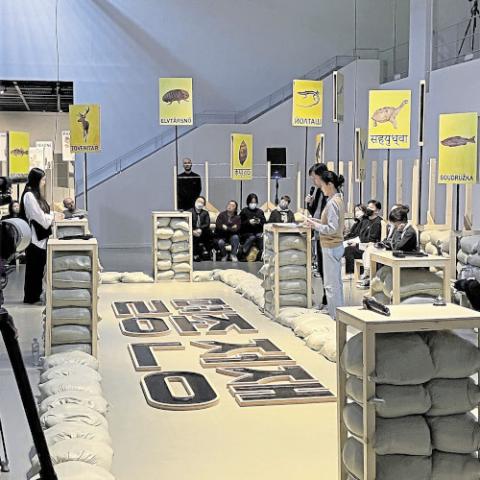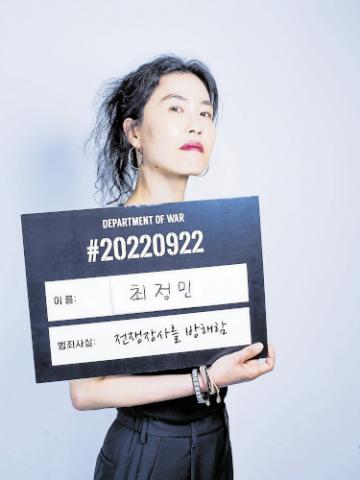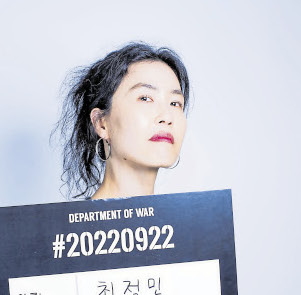At the War Resisters’ International gathering in London in June, I kept hearing about the amazing work of the South Korean anti-militarist group, World Without War. After many years of hard work, they won the right for conscientious objectors to do ‘alternative’ non-military service instead of being conscripted, despite South Korea being a highly-militarised state still officially at war with North Korea. The group has pulled off many creative and daring nonviolent actions over the years, including occupying a tank at a major arms fair on the outskirts of Seoul – a protest which has landed eight of their activists with a US$15,000 fine (between them all).
I interviewed their anti-arms trade campaigner, Choi Jungmin (pronounced ‘chwéh chong-min’), one of the eight campaigners hit by the $15,000 fine, at the WRI conference ‘Antimilitarist Roots’, on 18 June. (Choi, which means ‘tall’, is the fourth most-common surname in South Korea; nearly one in 20 people have it.)
Choi Jungmin:
I work at the anti-militarist organisation in South Korea called ‘World Without War’. It’s a really ambitious name (laughs) for a little, local organisation! I’m a staff member, dealing with the campaign against the arms fairs. We have a small working group. What I do is organise the meetings and design the campaign. Besides that, I do administrative work for my organisation, book-keeping, which I am really bad at! (laughs)
I became an activist, I think, because of my parents. My parents are not very educated but they are very progressive people. My father was just an average office guy and my mother was a housewife, that’s really common in their generation.
They’re from the Gwangju region, the heart of South Korea’s democracy movement. The Gwangju struggle happened in 1980, under the dictatorship of general Chun Doo-hwan. It’s a long story, but the South Korean people believe that our institutional democracy is from the Gwangju, so Gwangju people tend to be more progressive than people from other regions in South Korea. There is more support for progressive, little parties.
“To me, pacifists are people who believe that a better world can be achieved by nonviolent means”
My parents experienced the Gwanju struggle, so they became more progressive. When I was a college student, I attended every big rally against wrongdoing by the South Korean government. My parents always came along with me and supported me.
When World Without War won the alternative service system two years ago – before that conscientious objectors had to go to jail, now they don’t – my father had passed away but my mother was the one who said: ‘Congratulations.’
When I started in the peace movement, ‘the peace movement’ equalled ‘the reunification movement’. I didn’t think so. I don’t quite fancy being one nation with North Korea, though I think we need to have a right to communicate with each other and go freely there. But to become one nation is another thing.
When I started working on the conscientious objector campaign, I got to see some activists from the reunification movement. They told me: ‘Oh, your campaign is so good, because we are now under the US empire, our army is not our own army, it is controlled by the US. So, objecting to the US army is really good... but, after we are reunited with North Korea, we need to have our own army, a strong army, and then conscientious objection will not be an option.’
So I thought we needed to start what I saw as a real peace activism.
I believe I’m a pacifist. You know, since the establishment of the South Korean government in 1948, no group has engaged in armed struggle. Some citizens armed themselves during the Gwangju Uprising in 1980, but this was a spontaneous response to indiscriminate shooting by martial law forces. It is classified as a nonviolent struggle in Erica Chenoweth and Maria Stephan’s Why Civil Resistance Works.
I don’t get asked about pacifism very often so, sometimes when I get asked about it in WRI meetings or somewhere outside of Korea, I’m not sure what to say. I believe in the power of social movements, and South Korean social movements are nonviolent, so I believe in the power of nonviolent social movements. To me, pacifists are people who believe that a better world can be achieved by nonviolent means.
Nonviolent revolution? That’s a really big ambition for civil society. I think it’s possible but that doesn’t mean if we just use nonviolence, revolution is naturally coming, but we need to think more strategically so that we can achieve what we want. I think nonviolent revolution may come to us if we are strategically planning for it!

Alternative service
We worked hard for more than 10 years for the right to conscientious objection. I think we succeeded mainly because so many – about 600 – conscientious objectors went to jail every year.
That’s more than 20,000 objectors who have been in jail.
I think the government and the whole judicial-legislative system couldn’t bear it any more because of the number of objectors.
We did have a plan. First, we shake the judicial system by taking every single case to court: first court and second court and then the supreme court – and then we go to the constitutional court.
If that didn’t budge things enough, we would go to the legislators [to parliament] and then to the administrators [executive departments such as the ministry of defence, the national human rights commission and so on], and then, if all that failed, we would go to the UN. So, this cycle worked quite well.
I know, for example, the Spanish conscientious objection movement, they never demanded alternative service but, for us, the demand made conscientious objectors seem more mature – not immature, selfish young boys trying to mess everything up. Instead, they are quite responsible, taking care of their community. They have that kind of image because they demand alternative service.
After more than 10 years of campaigning, we had a ruling from the constitutional court in June 2018 that the system was not in accordance with the constitution. So, the legislators [the national assembly, South Korea’s parliament] had to address this by passing a new law, which they did in December 2019, and it’s been implemented since June 2020.
Did we celebrate our success? We did have a party (laughs) on the day the constitutional court ruled against the old system, we had a small party! (laughs) The rest of the day, we thought about how we could address the new alternative service system. [Conscription in South Korea is for 18 months’ military service, which was also how long most COs spent in prison for their ‘crime’. Alternative service now means spending three years, twice as long, working and living in a prison – including sleeping in military-style barracks – with only a few weeks of leave each year. It’s a prison sentence without a criminal record – ed]
Now, we have to monitor what’s going on with the alternative service system. I think we have collected enough information and we plan to have a strategy meeting later this year to make a change to our conscientious objection campaign.
Arms fair campaign
Since we achieved our goal, we needed to redirect our campaign. Our second campaign, against the arms trade and arms fairs, started before this victory, because the previous government had promised us they would address alternative service... but the government changed and the new conservative government dropped the promise.
The second campaign got bigger and bigger and now it’s our main campaign. Some activists had felt we needed another campaign, for two reasons.
Firstly, because our movement was getting bigger and more stable and so we had more capacity to tackle the pillars of militarism. That’s one reason.
The second is that we felt the conscientious objection movement did not embrace all the activists in our organisation. No matter how hard we tried, the campaign was seen to be about heroic male conscientious objectors – and there were also a bunch of female activists who supported them and who were sometimes weeping (laughs) for the conscientious objectors. Especially the media, they didn’t buy our efforts to present a different image.
We thought we needed another project, but it should embrace all the activists who are willing to take part.
We went to the WRI conference in 2006. Back then, our language capacities were really limited. We were invited to make a presentation on our movement to the theme group on conscientious objection – some of us who participated could speak some English. [‘Theme groups’ meet over several days at WRI conferences, led by the same person – ed]
We saw the list of workshops and we picked one other theme group, just one, because we only had one person in our delegation who spoke and understood English well. We picked the group on the arms trade and we got so inspired! It was international solidarity.
After that, we formed a study group and we studied books and other campaigns. In 2010 or 2011, we started our own campaign. The first thing we picked was a campaign against cluster munitions because two of the biggest cluster munition producers are South Korean companies.
Then, I believe in 2013, we got an email from Campaign Against Arms Trade in the UK telling us that South Korea was still producing tear gas and even exporting it to Bahrain to help suppress its pro-democracy movement. We were shocked. We decided to stop what we were doing and campaign on this.
We did everything we could. We raised money, we invited Bahraini activists to South Korea, we took them to public events and to the national assembly. We successfully stopped the shipments to Bahrain.
Two years later, we stopped shipments to Turkey as well.
The factors behind our success: firstly, I think we made a good story. In South Korea, we don’t get to see tear gas smoke any more. We were so angry. [Tear gas was a hated weapon of repression used by South Korean dictatorships over many decades and it became a major focus of the democracy movement in the 1980s, leading to a ban on its use by the police in 1999 – ed]
We approached victims of tear gas from the 1980s, people from the democracy movement against the dictatorship. Their voices are really powerful for the South Korean public, that’s the one thing I would say had an effect.
There was also a whistleblower. We got the information about when the shipment would happen, when the company’s board meeting would happen, all sorts of information. He was not a model whistleblower, he had been fired for reasons I can’t remember, so he was angry and approached us to give us information, which saved us a lot of energy. That was also another factor in our success.
Of course, there was also the international solidarity. If it hadn’t been for CAAT, we couldn’t have imagined that South Korea manufactured tear gas and sold it to Bahrain. That story we learned from international solidarity. Whenever we had an action or an event in South Korea, CAAT friends did solidarity actions in front of the South Korean embassy in London, so that all really went well.
The South Korean government felt internal pressure and, of course, pressure from the outside. They gave up.

Arms fair action
In September last year, we did a small action at the DX Korea [Defence industry eXhibition] arms fair, which is organised by the South Korean army.
We used to carry out actions at the ADEX arms fair, organised by the air force, which is bigger but, last year, for the first time, we did an action inside the army’s arms fair.
They got so angry. They pressed charges against us, for disrupting their business.
Eight of us went there, we climbed up on top of a K-2 Black Panther battle tank and a K808 White Tiger armoured vehicle and we played music and chanted and sang. These are not Hanwha Group weapons. We wanted to target Hanwha, which is one of the biggest South Korean arms dealers, for symbolic purposes, but the cowards just displayed miniatures of their weapons, so we gave up on that.
I don’t think we were up there that long, maybe five minutes. We got pulled down by the security guards.
The eight of us got fined a total of US$15,000, more or less, between us.
“We stopped the tear gas shipments to Bahrain. Two years later, we stopped shipments to Turkey as well"
I feel angry. I did similar actions many, many times. Most of those times, there were no charges. One time, I got fined but it was a third of the amount. This one, I don’t understand. How come their deadly business is fine and trying to express my objection to their business is suddenly criminal? I don’t think it’s fair.
I’m trying to express my anger as creatively as possible. Going to jail instead of paying the fine is one way I’m expressing my anger.
The eight of us decided, after the action, when we got a notice from the prosecutor’s office about the amount of money we were going to be fined, that we would not pay at first and we would go to prison, at least for a few days or a week, before making any payment.
One day of imprisonment is the same as an $80 fine. By going to jail instead of paying all the fine right away, we are once again mocking the authorities and showing the courage and determination of the activists taking part in the action.
We’ve used this strategy before and we’ve found it effective in bringing issues back to the forefront. It’s also a great way to raise money for fines and for World Without War’s other actions!
Another problem is that, out of the eight of us, three of us are the staff members of World Without War. If we all go to jail, the office will be closed! We have to think about it strategically, how we can handle this situation.
It will take a long time, we plan to take this order to the official court, and the appeal court, and the supreme court, as far as we can go. It might take a year to be decided!


